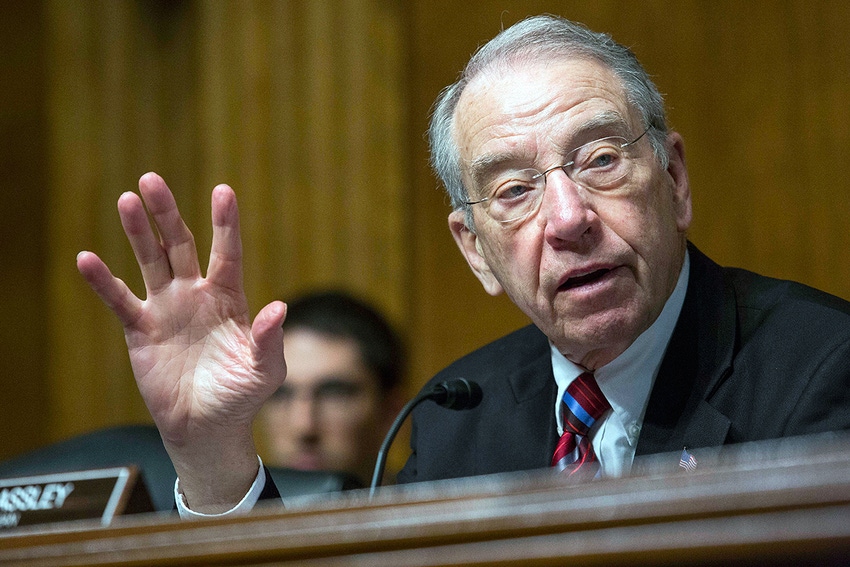September 15, 2016

The announcement of Bayer and Monsanto’s pending merger drew a swift response from commodity organization and members of Congress concerned about the potential for reduced competition between seed and trait and crop protection chemical suppliers.
One of those was Sen. Chuck Grassley, R-Iowa, who has scheduled a hearing of the Senate Judiciary Committee he chairs to hear testimony from the CEOs of Bayer (U.S. operations), Dow, DuPont, Monsanto and Syngenta and several farm groups next Tuesday (Sept. 20).
“Iowa farmers who I've spoken with are worried about rising input costs, especially in an increasingly weak agriculture economy,” Sen. Grassley said in a statement released shortly after Bayer and Monsanto officials announced the merger agreement during a press briefing in New York.
“Today’s announcement will only heighten those concerns. As mergers continue to occur in the seed, agrochemical and fertilizer industries, federal antitrust regulators must be ever more vigilant to ensure a robust competitive environment in this important sector.”
As Sen. Grassley noted, two other proposed mergers of seed and agrochemical companies – Dow and DuPont and ChemChina and Syngenta -- are being analyzed by the Justice Department and the Federal Trade Commission.
Collaborate as appropriate
“With several proposals under review, it’s crucial that the antitrust authorities collaborate as appropriate with each other, and the Department of Agriculture, in their analysis to ensure that competition is preserved for farmers and consumers.”
Representatives of the American Farm Bureau Federation, the National Corn Growers Association and the American Soybean Association said their organizations will also be studying the impact of the proposed Bayer-Monsanto merger.
“The National Corn Growers Association is committed to protecting the best interests of our nation’s corn farmers,” said Chip Bowling, Maryland farmer and president of the National Corn Growers Association. “Our primary concern with respect to any merger is how it may affect input costs – particularly given the current farm economy.”
Bowling said the NCGA has completed a thorough analysis of one of the previously announced mergers and provided its comments to the U.S. Department of Justice during their investigation into the merger.
“We would anticipate following a similar path with respect to this merger so that we can truly understand the merger’s impact on agricultural research, innovation, and competitive pricing of farm inputs,” said Bowling.
Affect on farm input costs
ASA President Richard Wilkins, a soybean farmer from Greenwood, Del., said his organization will also evaluate the proposed acquisition of Monsanto by Bayer.
“With respect to any merger and acquisition affecting soybean farmers, ASA is concerned primarily with how these affect the farm input costs of farmers, as well as how they impact innovation, research and competition in the marketplace,” said Wilkins.
“ASA intends to closely analyze the potential impacts of this proposed merger on soybean farmers to provide comments to the companies and U.S. regulatory authorities that must approve any acquisition, including the Justice Department. If our analysis identifies areas of concern, ASA would urge divestiture of any segments of the proposed merger where competition would be significantly impacted, or disapproval of the merger. “
“Market forces led to deals like the one announced today, but we know that major-company mergers have a profound impact on the tools available to farmers and ranchers, sometimes to their detriment,” said Bob Young, chief economist for the American Farm Bureau Federation.
“This deal between Monsanto and Bayer comes close on the heels of the proposed Dow-DuPont merger. Farm Bureau believes the Department of Justice should undertake a close review of the overall business climate that has encouraged these combinations, rather than evaluating them in isolation. Consumers must continue to have fair access to the best technologies and innovation.
“Farmers and ranchers, in particular, are interested in how these deals will impact research and development budgets for companies like Bayer and Monsanto. We depend on access to enhanced technology, and would hate to see agricultural innovation suffer at the cost of business decisions.”
To view live streaming of the hearing, click on http://judiciary.senate.gov.
About the Author(s)
You May Also Like






